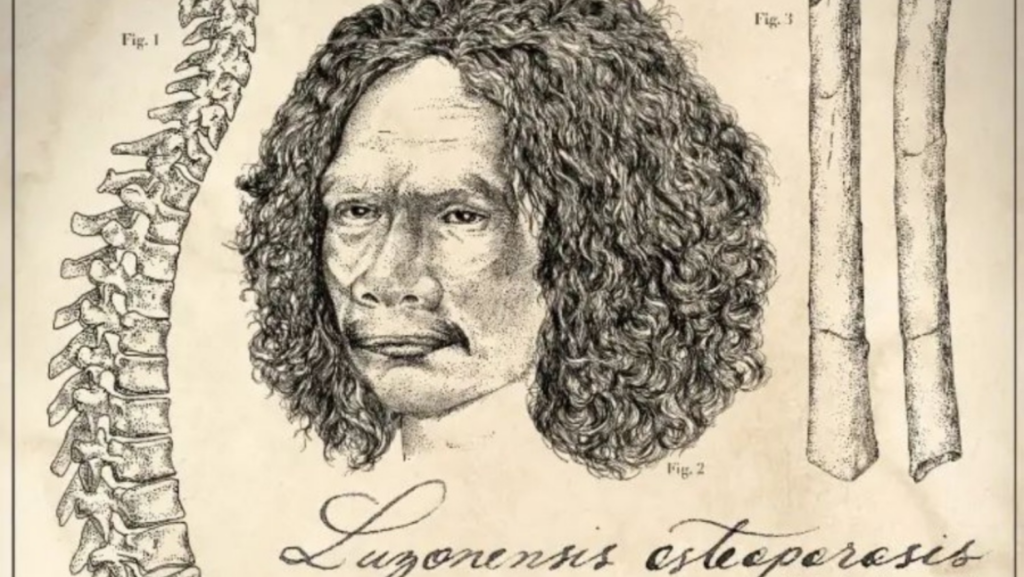Prehistoric hominid-turned-migrant worker stars in a PH short film premiering in Montreal

Photo from “Luzonensis Osteoporosis” official poster
Do you ever wonder what it would be like if our ancestors had to deal with the same bureaucratic problems we face today? And by ancestors, I mean the prehistoric ones—those who lived in caves and hunted for a living.
No? Me neither. But sometimes, our creative minds can lead us down the strangest paths, and that’s exactly how the Filipino short film “Luzonensis Osteoporosis” came into existence.
Directed by Quezon City-based filmmaker Glenn Barit, this natural science fiction film offers a surreal allegory of the country’s brain drain and labor export policies. It explores the story of Luzonensis—a prehistoric hominid preparing to venture overseas as a migrant worker.
But here’s the catch: He loses his passport hours before departure, which sends him and his father on a desperate search for the missing document. As they retrace their steps, they stumble upon unexpected twists, hilarious encounters, existential reflections, and back pains.
“Luzonensis Osteoporosis” to premiere in Canada
“Luzonensis Osteoporosis” is currently gearing up for its international debut at the Fantasia International Film Festival in Montreal, Canada—as part of the “Pinoy Party: Filipino Short Films” selection.
View this post on Instagram
The film delves into the concept of migration, the normalized act of leaving one’s home country. It also tackles on the complexities of identity and native heritage. “In my head, it makes so much sense to leave the country if given the chance, but of course, that is also hampered by a lot of contradictions,” says Barit in an exclusive interview.
“Since Fantasia is in Canada, it’s a great space to show the film as Canada is one of the top places where Filipinos tend to migrate to,” the 31-year-old director adds. “So, I hope a lot of Filipinos or even migrant workers and immigrants from other countries will be able to watch it there. It would be a nice place for casual discourse.”
You may also like: 5 rising Filipino Canadian talents taking the acting world by storm
The festival runs from July 20 to Aug. 9, but “Luzonensis Osteoporosis” is slated on Aug. 7 (7 p.m.) at the J.A. de Sève cinema.
A hominid as a migrant worker
It might seem ironic to use a prehistoric hominid to represent modern-day migrant workers, but Barit has his reasons.
“My hometown is 30 minutes away from Callao Caves, where the discovery of the Homo luzonensis happened,” says the director. “I was fascinated by it and thought it would be a nice representation of myself, especially since the Homo luzonensis might be considered the first Cagayano or even the first Filipino.”
Diving deeper into the symbolism, Barit highlights the migratory nature of hominids. He also emphasizes how it parallels the current reality of Filipinos seeking opportunities abroad due to an “unstable and unjust socio-political landscape” in the country.
“We are moving [to] whichever country is possible for us—not by choice but definitely by circumstance—the same way hominids are seeking for safe spaces from wild beasts and harsh conditions,” he explains.
The symbolism behind their “aching back”
As the narrative unfolds, the characters’ aching back becomes a recurring device in the film. Barit revealed that this element was inspired by a chance encounter with his neighbor—an archaeologist specializing in back pain studies.
“[Apparently,] we have back pain because we are not accustomed to being upright. Our ancestors used to be quadrupeds. They walk on all fours,” he shares. “[So] I thought of using it as a cheesy metaphor for the two main characters.”
Returning home after working overseas, Luzonensis’ father already has an upright back. It’s an implication that he has finally embraced the ways of the modern world. Meanwhile, Luzonensis still yearns for his homeland, finding solace in his primal instincts and arched back. “To put it bluntly, their backs ache as a reminder of home and their identity.”

And as “Luzonensis Osteoporosis” continues its journey in festival circuits, Barit already has future projects in mind. He plans to shoot a short film in July and another one later in the year. And while he’s itching to work on another feature film, he knows that “good things take time.”
Aside from Barit’s “Luzonensis Osteoporosis,” these Filipino films are also going to Fantasia: Kenneth Dagatan’s “In My Mother’s Skin,” Maria Estela Paiso’s “It’s Raining Frogs Outside,” Whammy Alcazaren’s “Bold Eagle,” Kala Galang’s “When You Left Me on the Boulevard,” and Stephen Lopez’s “Hito.”

